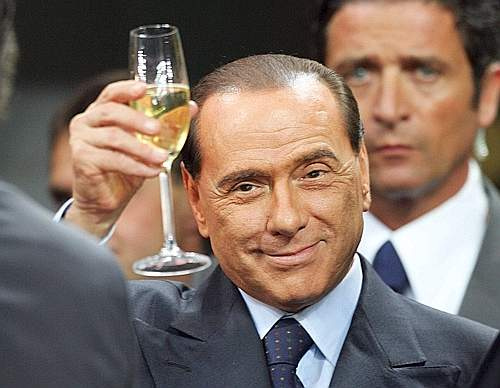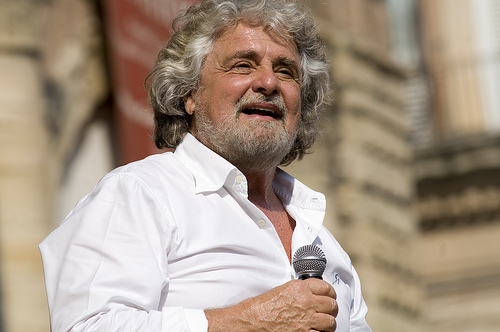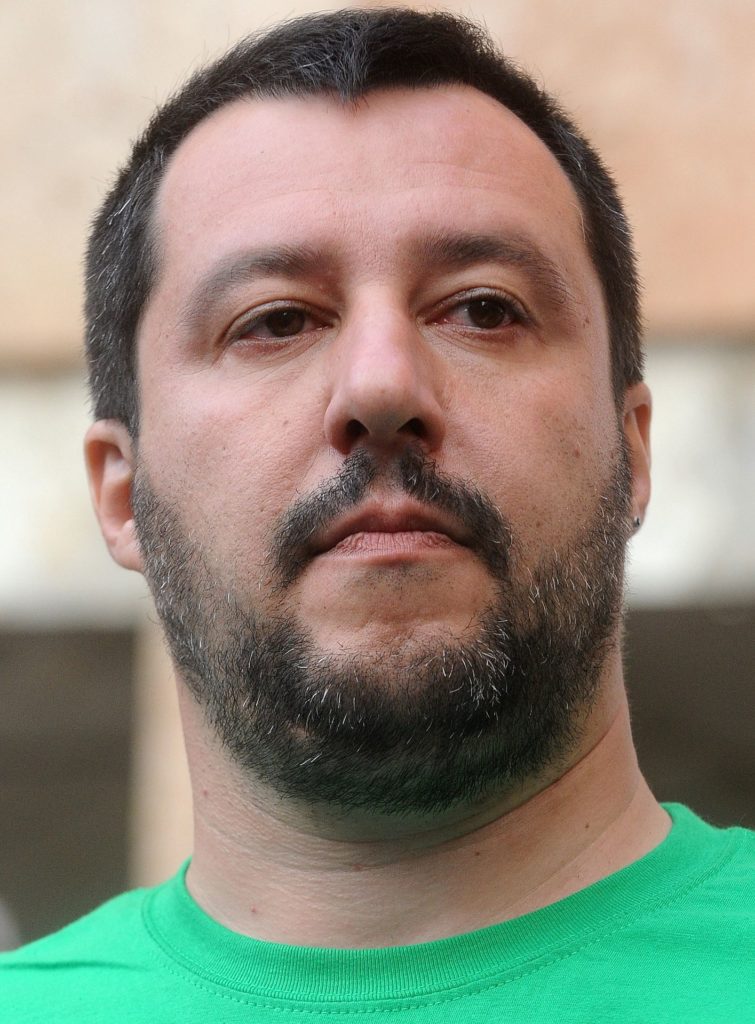Back on March 3rd I predicted that the outcome of the Italian elections would be chaos and paralysis. Which amazingly enough is exactly what happened.
I must be some kind of clairvoyant genius. Quick, someone pass me a lottery ticket!
Nah just kidding. This is Italy, the electoral system (not to mention the nature of the Italian people themselves) always leads to chaotic paralysis in the immediate aftermath of every election. It’s not a bug; it’s a feature (although this particular round might just prove more amusing than previous ones).
Italian electoral politics from the end of World War 2 through to the collapse of the Cold War consensus in the early nineties was pretty boring, and deliberately so.
After crushing Mussolini, the U.S occupiers designed the new Italian electoral system primarily as a way to keep out the very strong (and slavishly Stalinist) Italian Communist party. It did this by more or less keeping the same group of elite scumbags in power for almost fifty years. This would have led to corruption in any country; in Italy (home of the mafia) it led to insane, super-dooper to-the-point-of-absurdity levels of corruption.
So as the Cold War ended and the political system collapsed under the weight of its own putrid venality, the people of Italy were looking for a change, they were looking for a new broom to sweep away the past and bring in a bright new future.
What they got was Silvio Berlusconi.

The Milanese media magnate thrust himself aggressively onto the national scene, supported by minor partners Gianfranco Fini (of the post-fascist National Alliance) and Umberto Bossi (of the separatist Northern League) grabbing hold of his coattails. Silvio took the Italian nation on a combination soap-opera/roller coaster for the better part of two decades, using his media ownership and absurdly Italian public image to rise to the top again and again until he was undemocratically cast out by the EU in 2011 and narrowly lost at the polls in 2013.
This election looks a lot like a normal Italian poll, with contesting coalitions currently struggling to form a government, but this time it’s different for three important reasons:
1. Twinkle, twinkle little star
The undisputed winner of this election was the insurgent-populist, anti-establishment 5 star movement who garnered a truly impressive 32% of the national vote. 5-star (or M5S) has more or less cemented itself as the most successful new party in 21st century Western Europe, going from nothing to number one in Italy in under 10 years. As such it wouldn’t be surprising if the Italian President Sergio Mattarella gave them first shot at forming a government.

But that might be tricky. The entire purpose of M5S, since its foundation by comedian Beppe Grillo in 2009, was to NOT go into dirty deals with the establishment parties. They were founded explicitly as a party against corruption, and doing a deal with the insanely corrupt eurocratic centre Left Democratic Party or the even more notoriously corrupt Silvio Berlusconi might just bring them down entirely.
Neither would an alliance with the other insurgent anti-EU, anti-establishment party the Northern League (or Lega) help them much. M5S has been coyly anti-immigration but Lega would be unlikely to sign on to any coalition with anyone who doesn’t explicitly promise to close the borders and deport the 600,000 illegals currently residing in Italy.
M5S finds itself the prettiest girl at a party where everyone she wants to dance with is taken and everyone who wants to dance with her with smells of urine and old cats. No matter which direction they try and go in disaster is only a slight slip away.
2. The rise of the Right
The Right wing alliance consisting of Berlusconi’s party Forza Italia, Giorgia Meloni’s Brothers of Italy and Matteo Salvini’s Lega were by far the most popular coalition at 37%. This isn’t unusual. In different forms the same players have made up winning coalitions as far back as 1994. But this time one crucial aspect is different.
In all the Right wing coalitions of the last quarter century Silvio Berlusconi has been the dominant player. With the limited appeal of post-fascist parties and the self-imposed regional nature of the League, Silvio was always able to use his money and public profile to be the dominant figure (and thus Prime Minister) in any coalition.

This time the Northern League changed its name to Lega and began campaigning in earnest nationwide. Its charismatic leader Salvini pounced on the migrant crisis, and began pointing out that in Italy’s current economic situation, the idea of taking in strangers when they were unable to care for their own simply because Germany had invited them, was insane.
His call to deport all 600,000 uninvited arrivals, and to penalise the NGO “taxi service” supposedly “saving” such people by ferrying them into southern Italian ports, struck a nerve for the first time both in the north and in the south (although I suspect his suggestion of invading Libya to do so might have put some people off).
This of course horrified the usual suspects on the Left already screaming hysterically about Fascism on the rise and Mussolini returning. But with ordinary people it struck home. Salvini managed to secure almost 18% of the vote, outstripping Berlusconi on 14% and Brothers of Italy on 5%. This means that if by some miracle the Right finds a way to form government without M5S Italy will have a “far Right” Prime minister.
That would be worth seeing, just to listen to the frantic wailing and screams of agony emanating from Leftists across Europe. It’d be like Brexit all over again, maybe even better.
3. The Death of the establishment
Historically the electoral map in Italy has looked like a sandwich. The far north and the south have swung Right while the centre-northern area above Rome has swung very, very far to the Left. After the shake-up of the early 90s this changed somewhat, with the far north increasingly swinging to populists such as the Lega Nord while the far south started voting for whoever promised them more handouts of northern taxpayer’s money.
Regardless of who won however, elections in the post 90s landscape were dominated by Berlusconi on the centre-Right and an amalgam of various centre-Left and post-communist parties that eventually coalesced under the banner of the Democratic Party in 2007.
That consensus has been blown out of the water.
As mentioned above Berlusconi’s centre Right Forza Italia sank to 14% of the vote. This is by far the lowest ever vote for a Berlusconi led party. The people who once flocked to the serenely smiling, semi-senile seducer simply aren’t feeling the vibe anymore.
The centre Left, pro-EU Democratic Party got around 18% of the vote and the wider centre Left coalition scraped only 22%. This is the worst result for the establishment Left in modern history and their leader Matteo Renzi has immediately resigned.

A huge amount of the vote from the centre-Left and centre-Right have flooded to 5-star and Lega. These two groups together, both anti-establishment, both anti-EU, both sceptical (to say the least) on immigration gained almost 50% of the vote between them. Lega appears to have managed to strike out from its traditional northern strongholds while voters from both the Left and the Right in the south have flocked to M5S as a grand f— you to the entire European and Italian political class.
Like most elections, this one is important less for the policies that will be implemented and more for what it tells us about shifts in the culture and thinking of the people who voted. Italians are no longer even slightly hesitant to voice their disapproval of mass migration (particularly from Africa) and are no longer the least bit shy about loudly voicing their disgust with the establishment as it stands.
They don’t trust the EU, they don’t trust their politicians, they’re sick of the sclerotic economic recovery they’ve been suffering under and they sure as hell don’t believe that mass immigration will make them richer or that “diversity is their strength”.
Regardless of who eventually forms government the message is loud and clear. Europe as a whole continues to slowly march away from the post-Cold War dreams of the Liberal internationalists. The old order is slowly crumbling; but what will take its place is still yet to be seen.









